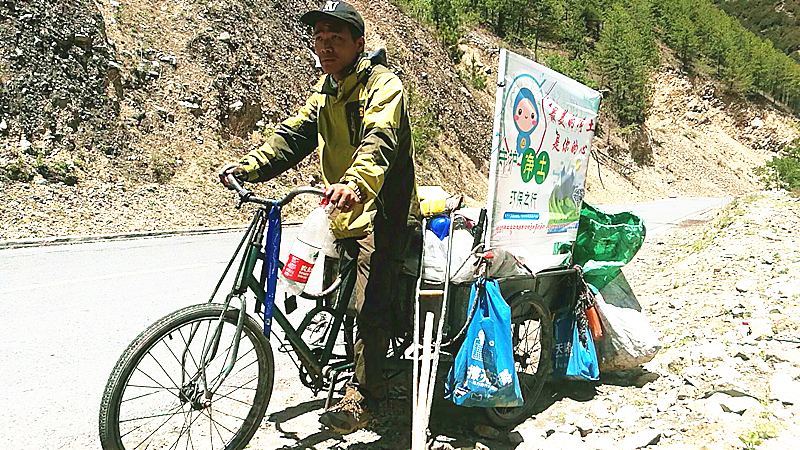Cyclist spends 90 days on the road collecting rubbish on Tibetan highway

Lin Peng rides on his tricycle along the Sichuan-Tibe Highway en route to Lhasa, the capital of the Tibet autonomous region. Provided to China Daily
BEIJING — A young traveller who collected garbage alongside the Sichuan-Tibet Highway for nearly three months has attracted a lot of social media attention recently.
Lin Peng, 28, spent 90 days on the road after quitting his job with a telecommunications company in Guangzhou, Guangdong province.
After starting his journey in Ya’an, Sichuan province, on April 20, he cycled and trekked more than 20 kilometers every day, collecting rubbish on the way.
Lin arrived in Lhasa, the capital of the Tibet autonomous region, on July 21 and returned home recently.
Most of the time during his journey he was on his own, with just his tongs, a pair of gloves and a second-hand tricycle with a flat cart.
Article continues after this advertisementSometimes he made friends with hikers inspired by his clean-up campaign, and they helped him collect waste for a few days before going their separate ways.
Article continues after this advertisementHis face has become weather-beaten and tanned from his time on the road.
Lin said it was his second visit to Tibet, after a cycling trip last year, but this time he chose to make his journey a small contribution to nature.
“I’m always sad to see that so many beautiful spots are polluted, and I decided to make another trip for environmental protection,” he said.
“The last time I was in Tibet, I saw a lot of waste on the roads, in the rivers and at the Base Camp of Qomolangma (known as Mount Everest in the West), and my heart was crying.”
He said another reason for adventure was to repay the kind-hearted people who helped him on last year’s trip, when he first thought about becoming a promoter of environmental protection.
Temperatures in Tibet in May can be frigid, and the weather was fickle, making it one of the biggest challenges on his journey.
Lin frequently encountered extreme weather conditions such as blizzards and hail, and on May 4, when climbing Zheduo Mountain in Sichuan, he ran into three snowstorms.
“My whole body was almost completely soaked,” he said. “I was cold and tired. I had to spend more than three hours traveling the last 5 km, and I had to stop frequently to rest.”
Lin said the tourism service center was about to close when he arrived, and he was lucky he did not have to spend the night outside because it snowed the whole night.
Another time, the brakes on his tricycle failed on a downhill section of the highway and he was forced to use his feet to slow down. He then had to spend hours pushing the tricycle to the nearest county town for repairs.
He usually camped at night but would stay at an inn once a week.
“I thought the lack of garbage bins was the main reason for the waste everywhere, but that is not true because I found this time that tourists litter everywhere in the tourism zones,” Lin wrote on his micro blog.
To raise people’s awareness of the need to protect the environment, he had a banner on his tricycle reading, “The purest land is the people’s heart.”
While his trip has made the road cleaner and inspired and educated many people, his mother did not support the idea at first. She told him embarking on such a trip was foolish and risky, but later she changed her mind.
“My mom said she was sorry to see her son looking older and more like a garbage recycler in pictures, but she also said what I have been doing is a thing with lifelong meaning,” Lin, originally from Jiangxi province, said.
He took the trash he and others collected to the nearest garbage station for disposal or asked the drivers of passing cars to ferry it to a garbage station for him.
Lin said he saw the most garbage at Tibet’s Khatse La Mountain, where he collected six bags of trash in the space of two hours.
“Another place I saw a lot of waste was near Anjiula Mountain,” he said. “There was a lot of waste on the grassland, in the river and in the wetland-everywhere.
“I heard many nomads talking and laughing happily on the grassland, but I cannot be happy seeing a pastoral scene surrounded by waste.”